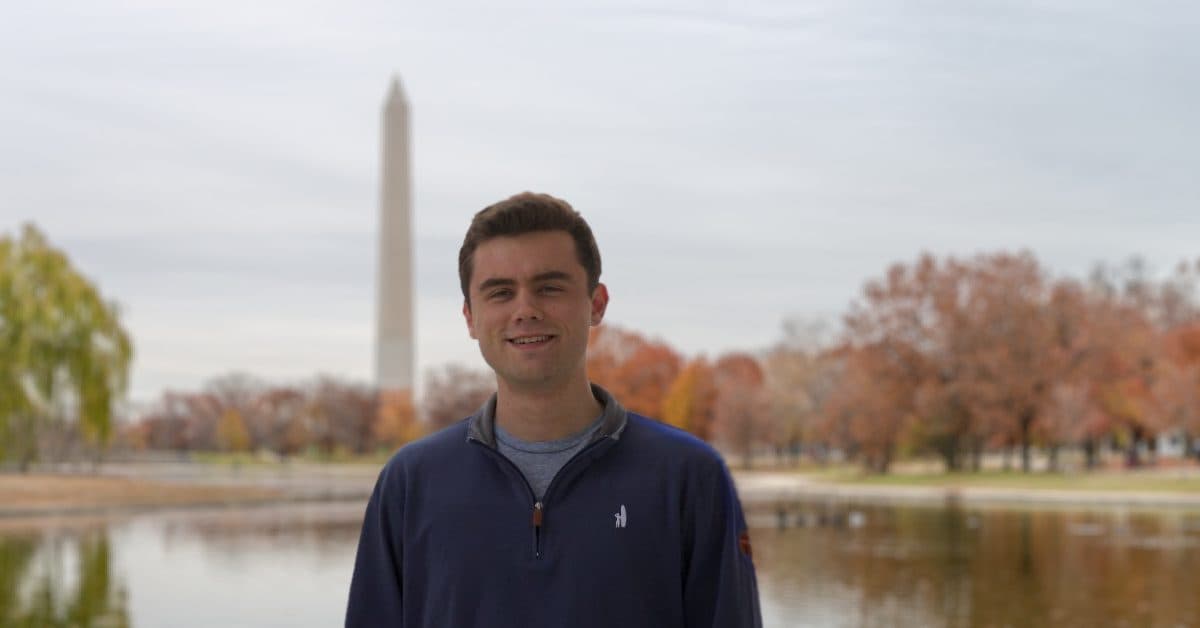This Crypto PAC Wants to Change the Narrative in Washington
HODLpac founder Tyler Whirty is leaning into the decentralized nature of cryptocurrencies to help people influence blockchain policy.

Tyler Whirty via Twitter (Washington Monument; Source: Shutterstock)
- With the help of a DeFi Education Fund grant, candidates’ stance on crypto will be publically available
- Donors will be able to direct funds toward any candidate or lawmaker, but the goal is to support DeFi allies
This digital assets-focused political action committee (PAC) is helping blockchain enthusiasts put their money where their mouth is, and influence Washington politics with their dollars.
HODLpac founder Tyler Whirty, who previously served as a staffer at DC-based libertarian think tank Cato Institute, is working on an application that would operate similarly to a decentralized autonomous organization (DAO). PAC rules and regulations make complete decentralization difficult, but there will be an emphasis on group decision-making.
“The idea is that it would be a DAO, to the extent that it’s able to be,” said Whirty. “We have to maintain a traditional bank account, so it’s a bit centralized, but we’re definitely going to be a community-governed PAC.”
In 2020, the PAC operated on a token-based system. Users who donated or subscribed to the newsletter were granted tokens that could be used to vote on where the money went through a voting application.
“It worked well, to an extent, it proved what a community-governed PAC could be, but it was kind of before DAO tooling is where it is now.”
The tokens ran on Rinkeby (an Ethereum testnet), Whirty said, to avoid gas fees. It was a good opportunity to test different concepts, he explained. The PAC ended up donating a total of $7,500 to ten candidates in 2020.
“Not anywhere near the $85 million that finance, as an industry, has donated,” Whirty said. “But, it’s a good dry run, and we got all the compliance stuff in place, so it was definitely not a lost cause.”
Things are expected to work differently in 2022. The team plans to build the “Gitcoin of political giving,” Whirty said, referring to the open-source platform for funding projects on Ethereum.
Individuals will be able to use HODLpac’s donation app, which has not yet launched, to give to any candidate that they want. As with the first iteration, the PAC quill use quadratic funding, Whirty said. “I think there are some benefits to that,” he said. “One being that smaller dollar donors will have their donations matched and amplified.”
Under quadratic funding, projects will be prioritized based on the number of donors, not just the size of donations because donations are matched by a shared pool — so the total amount given to a candidate is the square root of each contribution to it, summed and then squared. The strategy encourages donations of any size and is designed to ensure democratic allocation of funds.
“So people will be able to use the quadratic funding application and give to the candidates they want. They can also obviously give to the PAC itself — to the matching pool,” Whirty said. Both activities earn governance tokens.
Governing the influence of government in Washington
Governance token holders will be given some sort of power, although the details are not yet worked out, Whirty said.
App users and donors will be able to direct funds toward any candidate or lawmaker, but the idea behind the PAC is certainly blockchain-focused.
“The idea is that everyone will be able to donate to anybody, but obviously, we want to support strategic people and that’s where the challenge of decentralized governance comes in,” Whirty said.
To help combat this issue, Whirty said, the app will display something called a HODL Score, which will serve as a measurement for evaluating a candidate’s stance on blockchain-related policy.
“It’s this idea that we should have a tracker of where every legislator and candidate stands on crypto and everything that they’re doing,” he said. “Measuring and ranking is an interesting challenge.”
The HODL Score was something the team attempted to implement in 2020, but they did not have the funding to make it work, Whirty said. Now they do.
“We got a DeFi Education Fund grant to quantify these numbers,” he said. “It is a public resource to crypto overall but like it’s also essential to the functioning HODLpac, because we will be able to see how a candidate or congressman is when it comes to crypto-related issues.”
The DeFi Education Fund works to inform lawmakers and advocate for pro-DeFi policies. The HODL Score, Whirty said, will hopefully take into consideration all crypto-related statements and votes made by different candidates and lawmakers, including Tweets and public statements.
In the eyes of many crypto proponents, regulation is fundamentally at odds with the founding principles of cryptocurrencies, Whirty acknowledged.
“That’s something I’ve thought about a lot and I think the tide is turning,” he said. “People are realizing that this is not an existential threat, the technology itself isn’t going to be destroyed, but life can be made a lot harder in crypto adoption, people are realizing that it’s time to engage.”






